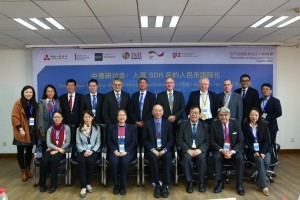Roundtable on Money and Finance • Autumn 2016 and Sino-German Workshop on RMB Internationalization after Its Inclusion into SDR Basket
2016-10-11 IMI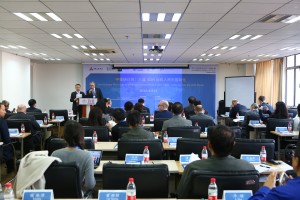 On October 11, Sino-German Workshop on RMB Internationalization after Its Inclusion into SDR Basket—Roundtable on Money and Finance • Autumn 2016, coorganized by IMI, the Sino-German Center of Finance and Economics (SGC), and People’s Bank of China (PBoC), Deutsche Bundesbank,
Deutsche Gesellschaftfür Internationale Zusammenarbeit (GIZ), and sponsored by Bao Shang Bank (BSB), was successfully held at Renmin University of China. The conference was attended by Jochen Metzger, director general, Payments and Settlement Systems, Deutsche Bundesbank; Martin Pontzen, director, Center for Technical Central Bank Cooperation, Deutsche Bundesbank; Henner Asche, deputy director general, Markets Department, Deutsche Bundesbank; Stephan Bredt, director of economy, Transportation and Regional Development, Hessen; Wolfgang Koenig and Rüdiger von Rosen, Co-CEOs of SGC; Wu Jianhong, member of the Executive Board, Sino-Europe International Exchange; Li Minhong, executive vice president and head of Markets at Deutsche Bank China, Deutsche Bank (China); Bu Yongxiang, deputy director, Research Institute of Finance, PBoC; Liu Ye, director of BIS Division, International Department, PBoC; Lv Tingting, director of Monetary Policy Cooperation Division, Monetary Policy II Department, PBoC; Zhong Hong, senior economist, International Finance Institute, Bank of China,; Lian Ping, chief economist, Bank of Communication; Hua Ercheng, chief economist, Bao Shang Bank (BSB); Wei Benhua, member of IMI Academic Committee, former deputy administrator-in-bureau (SAFE); Zhao Xijun, associate dean, School of Finance, Renmin University of China; Ben Shenglin, executive director of IMI; Tu Yonghong, deputy director of IMI. The conference was co-chaired by Ben Shenglin and Wolfgang Koenig.
On October 11, Sino-German Workshop on RMB Internationalization after Its Inclusion into SDR Basket—Roundtable on Money and Finance • Autumn 2016, coorganized by IMI, the Sino-German Center of Finance and Economics (SGC), and People’s Bank of China (PBoC), Deutsche Bundesbank,
Deutsche Gesellschaftfür Internationale Zusammenarbeit (GIZ), and sponsored by Bao Shang Bank (BSB), was successfully held at Renmin University of China. The conference was attended by Jochen Metzger, director general, Payments and Settlement Systems, Deutsche Bundesbank; Martin Pontzen, director, Center for Technical Central Bank Cooperation, Deutsche Bundesbank; Henner Asche, deputy director general, Markets Department, Deutsche Bundesbank; Stephan Bredt, director of economy, Transportation and Regional Development, Hessen; Wolfgang Koenig and Rüdiger von Rosen, Co-CEOs of SGC; Wu Jianhong, member of the Executive Board, Sino-Europe International Exchange; Li Minhong, executive vice president and head of Markets at Deutsche Bank China, Deutsche Bank (China); Bu Yongxiang, deputy director, Research Institute of Finance, PBoC; Liu Ye, director of BIS Division, International Department, PBoC; Lv Tingting, director of Monetary Policy Cooperation Division, Monetary Policy II Department, PBoC; Zhong Hong, senior economist, International Finance Institute, Bank of China,; Lian Ping, chief economist, Bank of Communication; Hua Ercheng, chief economist, Bao Shang Bank (BSB); Wei Benhua, member of IMI Academic Committee, former deputy administrator-in-bureau (SAFE); Zhao Xijun, associate dean, School of Finance, Renmin University of China; Ben Shenglin, executive director of IMI; Tu Yonghong, deputy director of IMI. The conference was co-chaired by Ben Shenglin and Wolfgang Koenig.
 In his opening remarks, Prof. Ben Shenglin put forward three points on the theme of the meeting. Firstly, monetary policies in the world are diverging, some countries adopting negative interest rates whereas others embracing rate hikes. Such a divergence is highly likely to influence the global coordination of macro economy policies. Secondly, as two major players on the global stage, China and Germany should work together to sort out the problems in global financial governance. The focuses of the two nations in this regard may differ, but this meeting is a good opportunity to communicate. Thirdly, the future trends and investment strategies in global capital market and pointed out that, after RMB’s inclusion into the SDR basket, issues such as the future trend of offshore RMB market, the interaction between the onshore and offshore RMB market, and what should the capital market do to meet the financing demands of offshore RMB are highly worth of discussion.
In his opening remarks, Prof. Ben Shenglin put forward three points on the theme of the meeting. Firstly, monetary policies in the world are diverging, some countries adopting negative interest rates whereas others embracing rate hikes. Such a divergence is highly likely to influence the global coordination of macro economy policies. Secondly, as two major players on the global stage, China and Germany should work together to sort out the problems in global financial governance. The focuses of the two nations in this regard may differ, but this meeting is a good opportunity to communicate. Thirdly, the future trends and investment strategies in global capital market and pointed out that, after RMB’s inclusion into the SDR basket, issues such as the future trend of offshore RMB market, the interaction between the onshore and offshore RMB market, and what should the capital market do to meet the financing demands of offshore RMB are highly worth of discussion.
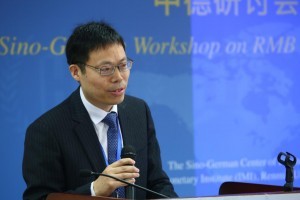 Mr. Bu Yongxiang claimed that RMB’s inclusion into the SDR basket is a result of the China’s thirty years of reform and opening up, and will in turn, promote the deepening of reform and opening up. Whether RMB can play a major role in the international monetary system really depends on whether China can maintain a robust growth in a long term. RMB’s inclusion brings both pressures and motives to China, mainly manifested in four aspects. Firstly, monetary policies have spillovers, which require China to embrace a more market-oriented exchange rate, and policy makers to strengthen communication with the market. Secondly, China needs to free up its capital accounts and capital market and take the opportunity of RMB’s inclusion into the basket to facilitate the capital account convertibility. In the financial market in particular, a two-way opening up of capital market is crucial to facilitate investments. Thirdly, financial regulations should be promoted. More prudent macro management measures in line with international financial regulation standard should be adopted in regulating capital flow. Fourthly, China’s capacity in macro regulation should be increased, ensuring that China’s regulation mechanism is aligned with the international standard and that Chinese government’s behavior to be more transparent.
Mr. Bu Yongxiang claimed that RMB’s inclusion into the SDR basket is a result of the China’s thirty years of reform and opening up, and will in turn, promote the deepening of reform and opening up. Whether RMB can play a major role in the international monetary system really depends on whether China can maintain a robust growth in a long term. RMB’s inclusion brings both pressures and motives to China, mainly manifested in four aspects. Firstly, monetary policies have spillovers, which require China to embrace a more market-oriented exchange rate, and policy makers to strengthen communication with the market. Secondly, China needs to free up its capital accounts and capital market and take the opportunity of RMB’s inclusion into the basket to facilitate the capital account convertibility. In the financial market in particular, a two-way opening up of capital market is crucial to facilitate investments. Thirdly, financial regulations should be promoted. More prudent macro management measures in line with international financial regulation standard should be adopted in regulating capital flow. Fourthly, China’s capacity in macro regulation should be increased, ensuring that China’s regulation mechanism is aligned with the international standard and that Chinese government’s behavior to be more transparent.
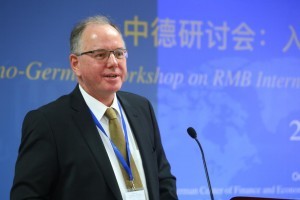 Mr. Henner Asche gave a brief review over the development of the international monetary system. He believed that RMB’s inclusion into SDR basket is a milestone for RMB internalization and a reflection of China’s elevated status in the international trade, of which the significance is no less than China’s entering into WTO. China’s efforts in industrial infrastructure, sustainable development and international trade laid a solid foundation for RMB’s becoming international reserve currency. Referring to the theory of Impossible Trinity and the example of the D-Mark internalization, he stressed the importance of independent policy, and gave precious advice to China’s opening up of capital accounts.
Mr. Henner Asche gave a brief review over the development of the international monetary system. He believed that RMB’s inclusion into SDR basket is a milestone for RMB internalization and a reflection of China’s elevated status in the international trade, of which the significance is no less than China’s entering into WTO. China’s efforts in industrial infrastructure, sustainable development and international trade laid a solid foundation for RMB’s becoming international reserve currency. Referring to the theory of Impossible Trinity and the example of the D-Mark internalization, he stressed the importance of independent policy, and gave precious advice to China’s opening up of capital accounts.
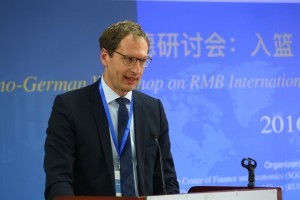 Mr. Stephan Bredt expressed a strong will to deepen the Sino-German cooperation. He pointed out that RMB’s recent development has significant implications for the economy and finance both of Germany and of the rest of the world. RMB is gaining increasing weights in worldwide investment and trading, which means RMB’s status is increasing. He believes that financial and economic cooperation between China and Germany will be a huge success and looked forward to more discussions on issues of European monetary system and the future of Asia’s development, and to more sharing in experience and inspirations.
Mr. Stephan Bredt expressed a strong will to deepen the Sino-German cooperation. He pointed out that RMB’s recent development has significant implications for the economy and finance both of Germany and of the rest of the world. RMB is gaining increasing weights in worldwide investment and trading, which means RMB’s status is increasing. He believes that financial and economic cooperation between China and Germany will be a huge success and looked forward to more discussions on issues of European monetary system and the future of Asia’s development, and to more sharing in experience and inspirations.
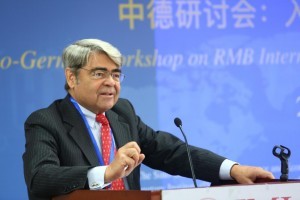 Mr. Rüdiger von Rosen shed a new light on RMB’s inclusion into the SDR basket by reviewing its past and envisaging its future. The adjustment of weights for major reserve currencies in the basket allowed for a possibility for RMB to be included, and RMB is becoming an international currency. But RMB’s market share still remains small, so the market, banks and the governments should have a reasonable expectation on the future of RMB internalization. With the example of the internalization of D-Mark, he claimed that a right and suitable path is vital for the development of a currency. He believed that RMB’s inclusion is beneficial for China and the EU in that they can broaden the scope of current currency mechanism and achieve a better cooperation.
Mr. Rüdiger von Rosen shed a new light on RMB’s inclusion into the SDR basket by reviewing its past and envisaging its future. The adjustment of weights for major reserve currencies in the basket allowed for a possibility for RMB to be included, and RMB is becoming an international currency. But RMB’s market share still remains small, so the market, banks and the governments should have a reasonable expectation on the future of RMB internalization. With the example of the internalization of D-Mark, he claimed that a right and suitable path is vital for the development of a currency. He believed that RMB’s inclusion is beneficial for China and the EU in that they can broaden the scope of current currency mechanism and achieve a better cooperation.
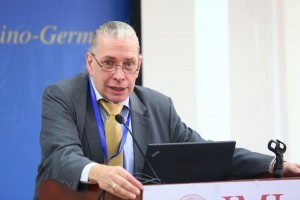 Martin Pontzen’s speech is themed on the D-Mark and its Internationalization. He pointed out that RMB shared a resemblance with the D-Mark in its development path and exchange rate movements. He elaborated on the internalization of the D-Mark, claiming that after embarking on its internalization, the currency first depreciated and then bounced back and began to appreciate, and the opening up of the currency is relatively slow but kept stable. He warned that once a currency becomes a reserve currency, it has to shoulder extra responsibilities which might interfere with the independence of the domestic monetary policy. He stressed that the D-Mark internalization is accompanied by a sound regulation, to which the credibility of the D-Mark in the international market is attributed.
Martin Pontzen’s speech is themed on the D-Mark and its Internationalization. He pointed out that RMB shared a resemblance with the D-Mark in its development path and exchange rate movements. He elaborated on the internalization of the D-Mark, claiming that after embarking on its internalization, the currency first depreciated and then bounced back and began to appreciate, and the opening up of the currency is relatively slow but kept stable. He warned that once a currency becomes a reserve currency, it has to shoulder extra responsibilities which might interfere with the independence of the domestic monetary policy. He stressed that the D-Mark internalization is accompanied by a sound regulation, to which the credibility of the D-Mark in the international market is attributed.
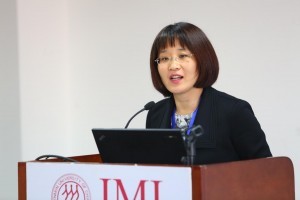 Ms. Liu Ye gave a speech on the official inclusion of the RMB into SDR basket and China’s financial reform and opening-up. She asserted that RMB’s inclusion into the SDR basket is both an opportunity and a challenge, and that the opening up and liberation of financial market is an unstoppable trend. RMB’s inclusion into the SDR basket is a milestone for China. It represents an international recognition of China’s achievements in economic progress and reform and opening up, also gave incentive and a new start for China’s further financial reform. But at the same time, China still lags far behind the advanced markets, and RMB’s status in global trade, financial trading, and reserves is not on a par with the US dollar and the British pound. China’s efforts in expanding SDR is paying off, but strengthening SDR is an arduous task that requires a long-term hard work.
Ms. Liu Ye gave a speech on the official inclusion of the RMB into SDR basket and China’s financial reform and opening-up. She asserted that RMB’s inclusion into the SDR basket is both an opportunity and a challenge, and that the opening up and liberation of financial market is an unstoppable trend. RMB’s inclusion into the SDR basket is a milestone for China. It represents an international recognition of China’s achievements in economic progress and reform and opening up, also gave incentive and a new start for China’s further financial reform. But at the same time, China still lags far behind the advanced markets, and RMB’s status in global trade, financial trading, and reserves is not on a par with the US dollar and the British pound. China’s efforts in expanding SDR is paying off, but strengthening SDR is an arduous task that requires a long-term hard work.
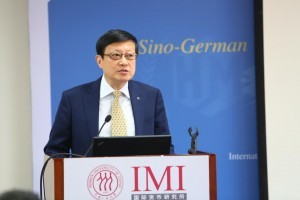 Mr. Lian Ping delivered a speech with the title RMB internationalization is entering a new period. He believed that the path of RMB internalization is switching from over relying on current accounts to a more balanced stress on both current accounts and capital accounts, from a debt-based model to a two-pronged model of both debt and asset. She also put forward four suggestions for RMB internalization. First, China needs to continue opening up its financial market and expand the RMB backflow channels and diversify the investing channels for overseas RMB holders. Second, China should keep upgrading its domestic financial market, diversify financial products, and step up efforts in building a derivative market, and improve basic systems of issuing, registering and rating. Third, proactively and steadily free up the capital accounts and improve the convertibility of capital accounts gradually. Fourth, RMB internalization shall be in consistent with the needs of the nation’s long-term strategies and macro-economic development, that is, the final purpose of RMB internalization is to serve the real economy, instead of achieving internalization for is own sake.
Mr. Lian Ping delivered a speech with the title RMB internationalization is entering a new period. He believed that the path of RMB internalization is switching from over relying on current accounts to a more balanced stress on both current accounts and capital accounts, from a debt-based model to a two-pronged model of both debt and asset. She also put forward four suggestions for RMB internalization. First, China needs to continue opening up its financial market and expand the RMB backflow channels and diversify the investing channels for overseas RMB holders. Second, China should keep upgrading its domestic financial market, diversify financial products, and step up efforts in building a derivative market, and improve basic systems of issuing, registering and rating. Third, proactively and steadily free up the capital accounts and improve the convertibility of capital accounts gradually. Fourth, RMB internalization shall be in consistent with the needs of the nation’s long-term strategies and macro-economic development, that is, the final purpose of RMB internalization is to serve the real economy, instead of achieving internalization for is own sake.
